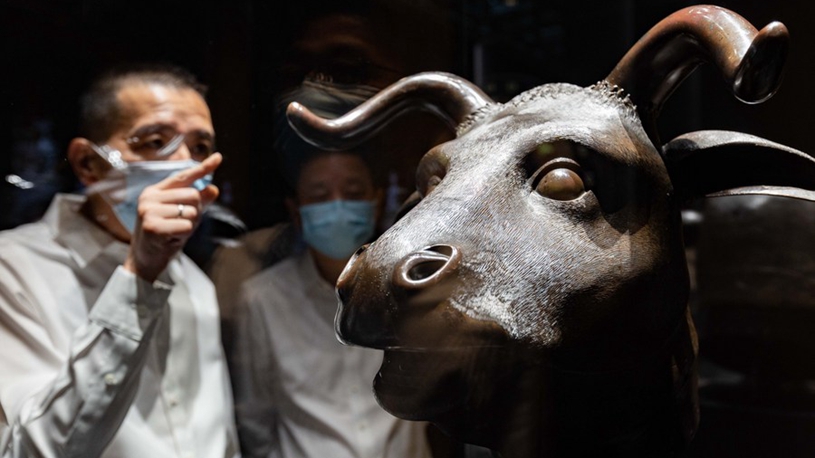* "Income and wealth inequality is higher in the United States than in almost any other developed country, and it is rising," said an April report.
* "Largely driven by the pandemic," life expectancy at birth in the United States declined by nearly a year to 76.1 years from 2020 to 2021, reaching its lowest since 1996.
* Firearm-related deaths increased by 15 percent to 45,222 in 2020, the highest ever recorded.
BEIJING, Oct. 4 (Xinhua) -- In a recent measurement of how countries have progressed towards the United Nations' Sustainable Development Goals, the United States ranked 41, after Cuba and before Bulgaria.
American experts consider it a dismal rating. Having dropped from its 2021 ranking of 32, the country has declined in indicators such as inequalities, labor rights protections and carbon emissions, according to the report by the UN Sustainable Development Solutions Network in June.
The rating is "the inevitable result of two problems," namely racism and a devotion to "American exceptionalism," political historian Kathleen Frydl wrote on Sept. 15, citing a February index that deemed the United States to be a "flawed democracy."
More reports have revealed the ills of today's America, where ordinary people have suffered too much from a system stuck in partisanship amid rising gun violence and an unprecedented pandemic.
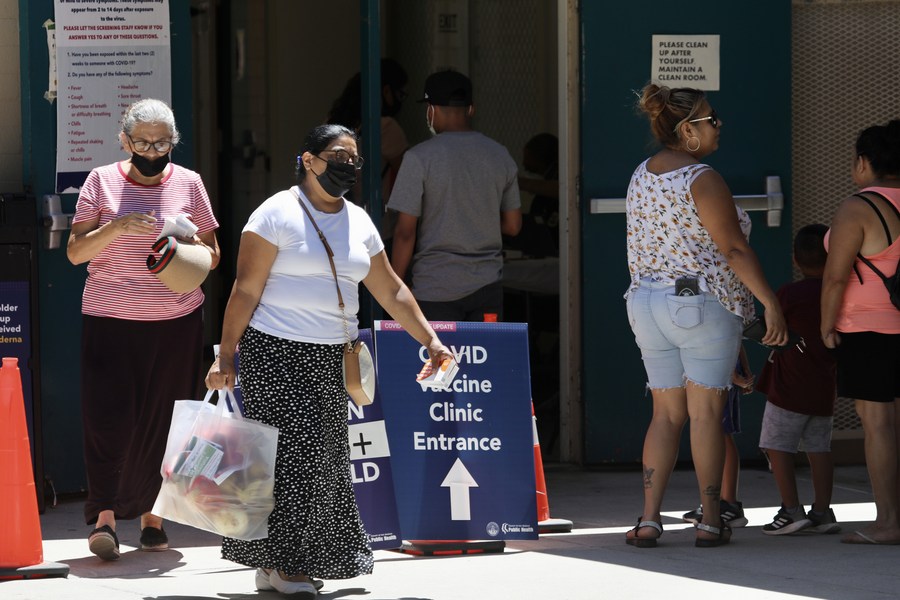
People wearing face masks are seen at a COVID-19 vaccine clinic in Los Angeles, California, the United States, on Aug. 5, 2022. (Xinhua)
TOUGHER LIFE
"Let our voices be heard, knowing that enough is enough," said Adrienne J. Gaymon, who sat through an eight-hour bus ride from Columbia, South Carolina, to join thousands of Americans in downtown Washington D.C. this June for a rally to call attention to the living conditions of low-income people.
She criticized what she called tax breaks for the rich and the rising cost of living, while "nothing's being done to help those that are struggling."
The rally took place near Capitol Hill, with protestors holding signs with messages such as "money for the poor, not for war," "lift from the bottom everybody rises," "stop racism now," and "injustice anywhere is a threat to justice everywhere."
"Income and wealth inequality is higher in the United States than in almost any other developed country, and it is rising," said an April report by the Council on Foreign Relations headquartered in New York, noting that between 1978 and 2018, CEO compensation and worker compensation increased by more than 900 percent and just 11.9 percent respectively.
In 1980, households in the top 10 percent in the United States had incomes about nine times that of households in the bottom 10 percent, while the ratio increased every decade since, reaching 12.6 in 2018, according to a report by the Pew Research Center in January 2020.
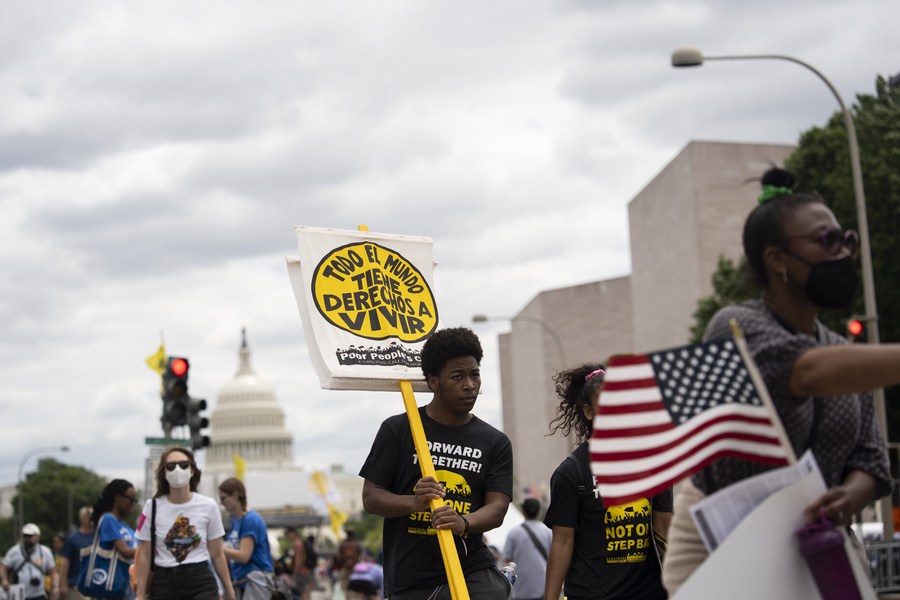
People attend a rally calling for attention to the living conditions of the low-income people and urging policymakers to do more to support those in the bottom, in Washington, D.C., the United States, June 18, 2022. (Xinhua/Liu Jie)
Gloria Brandman, a retired school teacher from New York City, told Xinhua at the rally that "so many people are just struggling right now, and we've seen the pandemic has just made it even worse for everyone, especially people without the money to take the precautions that they need."
"Largely driven by the pandemic," life expectancy at birth in the United States declined by nearly a year to 76.1 years from 2020 to 2021, reaching its lowest since 1996, the U.S. Centers for Disease Control and Prevention (CDC) said in August.
"In this country, by systematically neglecting public health over the last 30 to 40 years, we've lost a lot of ground," said Phil Landrigan, an epidemiologist at Boston College, the Boston Herald reported.
A breakdown of the data speaks more. In the first half of 2020, life expectancy at birth for African American populations dropped the most from 2019, by 2.7 years to 72 years, hitting a new low since 2001. Latinos experienced the second-biggest decline.
In January, the 2022 Edelman Trust Barometer indicated that the level of trust among U.S. citizens in their government was merely 39 percent, down by 3 percentage points from 2021.
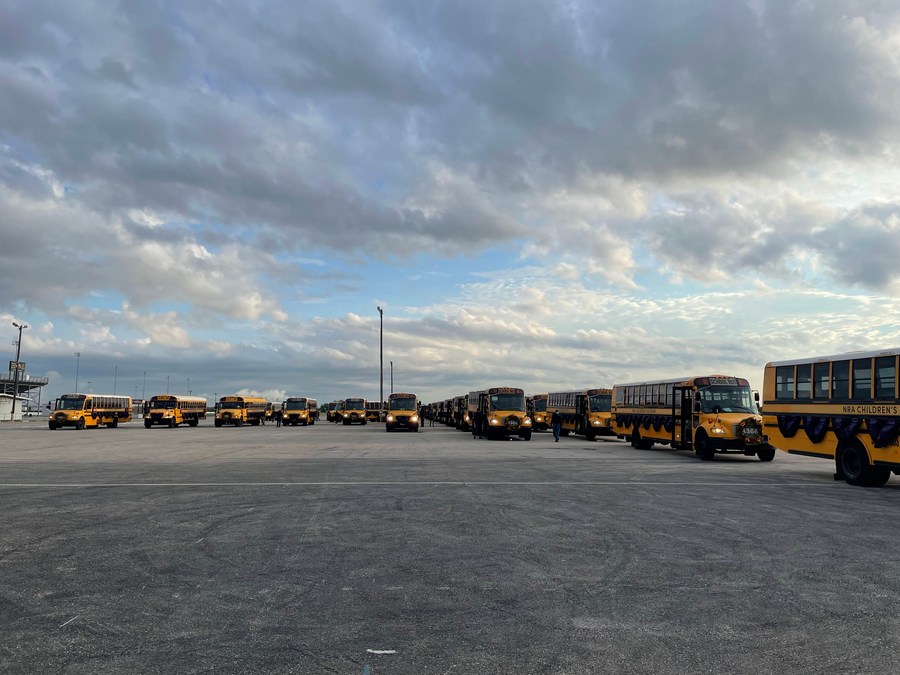
A yellow school bus convoy heads to pro-gun right U.S. Senator Ted Cruz's home and office in Houston, the United States, July 14, 2022. (Change the Ref/Handout via Xinhua)
RISING VIOLENCE
With less public confidence comes more violence.
On July 14, a mile-long convoy consisted of 52 yellow school buses headed to pro-gun right U.S. Senator Ted Cruz's home and office in Houston, the largest city of the gun-friendly state of Texas, to honor thousands of young victims of gun violence across the country and demand gun control reform.
The empty bus seats represented the 4,368 children killed by guns since 2020, according to the organizers, who said that Cruz was the leading recipient of gun lobbyist funding in Texas, with nearly 750,000 dollars in total.
Since 2020, firearms have overtaken car accidents to become the leading cause of death in children in the United States, said the CDC.
In 2020, firearm-related deaths increased by 15 percent to 45,222, the highest ever recorded by the CDC since it began tracking firearm deaths in 1968.
Twenty-one percent of U.S. adults say either themselves, a family member, or a close friend has had an experience with gun violence in the past five years, showed an August study from the University of Chicago Harris School of Public Policy and the Associated Press-NORC Center for Public Affairs Research.
But still, gun control remains stagnant between parties, with a century-old New York state law restricting a citizen's ability to carry a concealed handgun squashed by the Supreme Court in June.
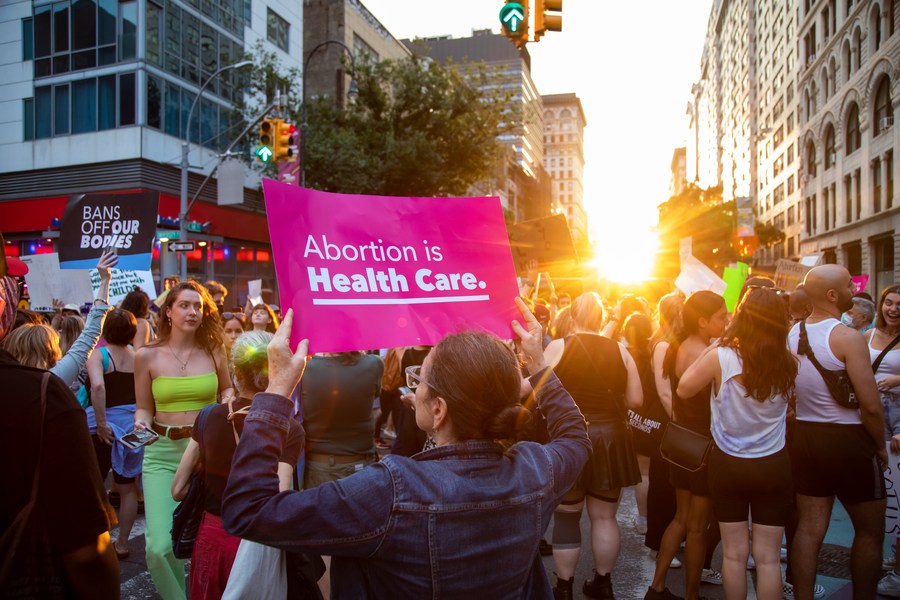
Demonstrators march during a protest after U.S. Supreme Court made decision to overturn Roe v. Wade, in New York, the United States, June 24, 2022. (Photo by Michael Nagle/Xinhua)
DECAYING DEMOCRACY
The increasingly unequal, split and violent society has laid bare the malfunctions of American democracy. As the Sweden-based International Institute for Democracy and Electoral Assistance said in November 2021, the United States was undergoing "democratic backsliding."
The Jan. 6 Capitol riot last year, which a Le Monde columnist this May has called "a symbol of a sick democracy," has shown how partisanship could undermine democracy, while 2022 has seen even more fierce antagonism between Democrats and Republicans, as well as between their supporters, in abortion, gun control and other issues concerning people's fundamental rights and wellbeing.
Now, after the search of former U.S. President Donald Trump's Mar-a-Lago estate by federal agents in August, part of a probe launched by the U.S. Department of Justice into whether Trump had mishandled classified documents, violent threats and calls for "civil war" erupted on pro-Trump forums online, with some far-right figures publicly spreading violent rhetoric.
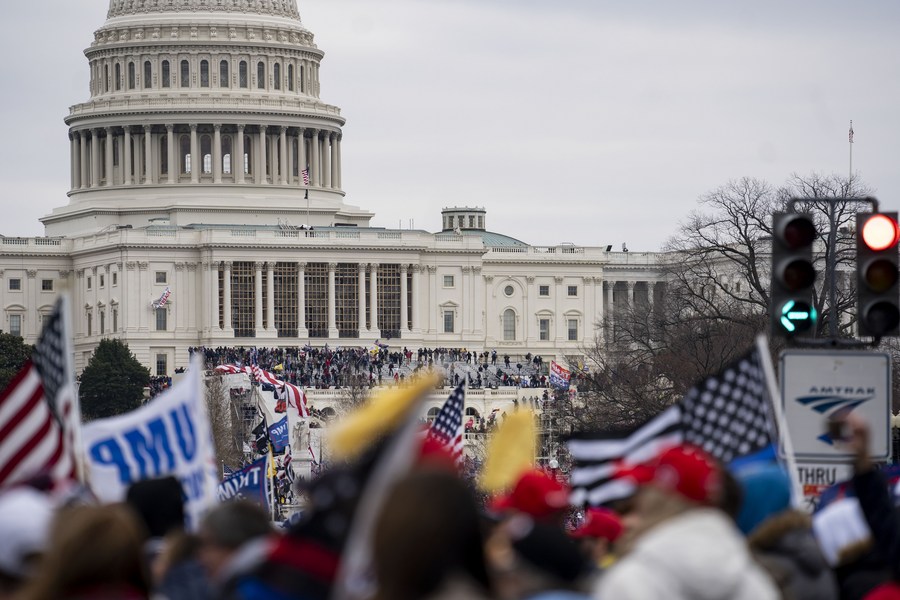
Supporters of Donald Trump gather near the U.S. Capitol building in Washington, D.C., the United States, Jan. 6, 2021. (Xinhua/Liu Jie)
The U.S. Department of Homeland Security and the Federal Bureau of Investigation said they have seen an increase in "violent threats" against law enforcement, judiciary and government personnel, including a particular threat to "place a so-called Dirty Bomb in front of FBI headquarters."
In a speech on Sept. 1, U.S. President Joe Biden himself admitted that "equality and democracy are under assault," lashing out at Trump and "MAGA Republicans" -- those who support Trump.
"For the West, the growth of social cleavages should come as a warning ... democratic institutions can provide cover for social divisions and allow them to be exploited for political gain, as has occurred in the United States and elsewhere in recent years," Amitav Acharya, professor of international relations at American University, wrote for Foreign Affairs in its July/August edition.
Marc Fisher, senior editor of The Washington Post, lamented in August that "it's easy and logical to conclude that the United States today stands as close to the edge of civil war as it has since 1861."
"We already live in a 'backsliding' democracy ..." Max Boot, a senior fellow for national security studies at the New York-based Council on Foreign Relations, wrote in July. "We seem to be sleepwalking to disaster." (Video reporters: Zhang Mocheng, Hu Yousong, Zhao Xu; video editors: Zhu Cong, Yin Le, Zhao Yuchao, Hui Peipei)■






